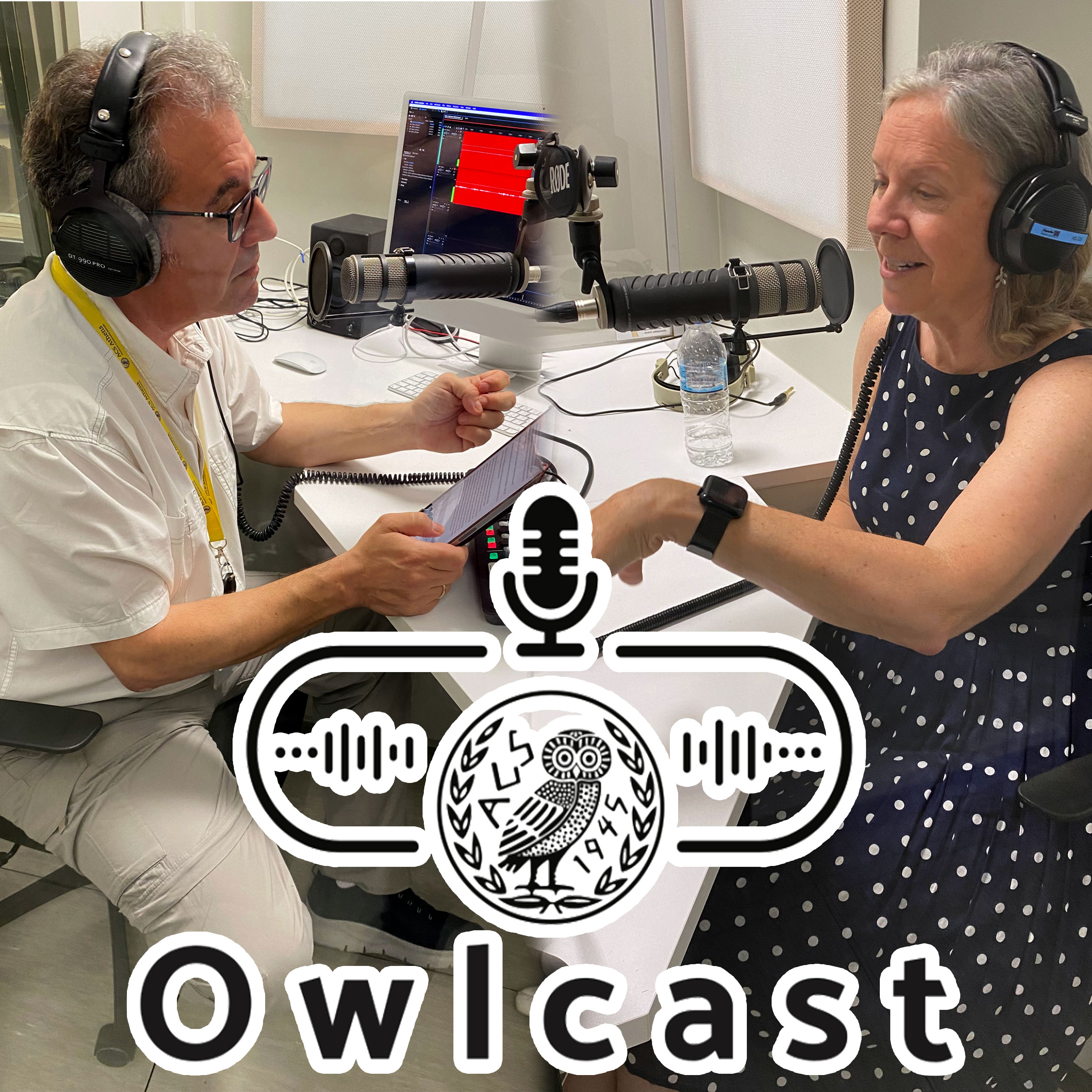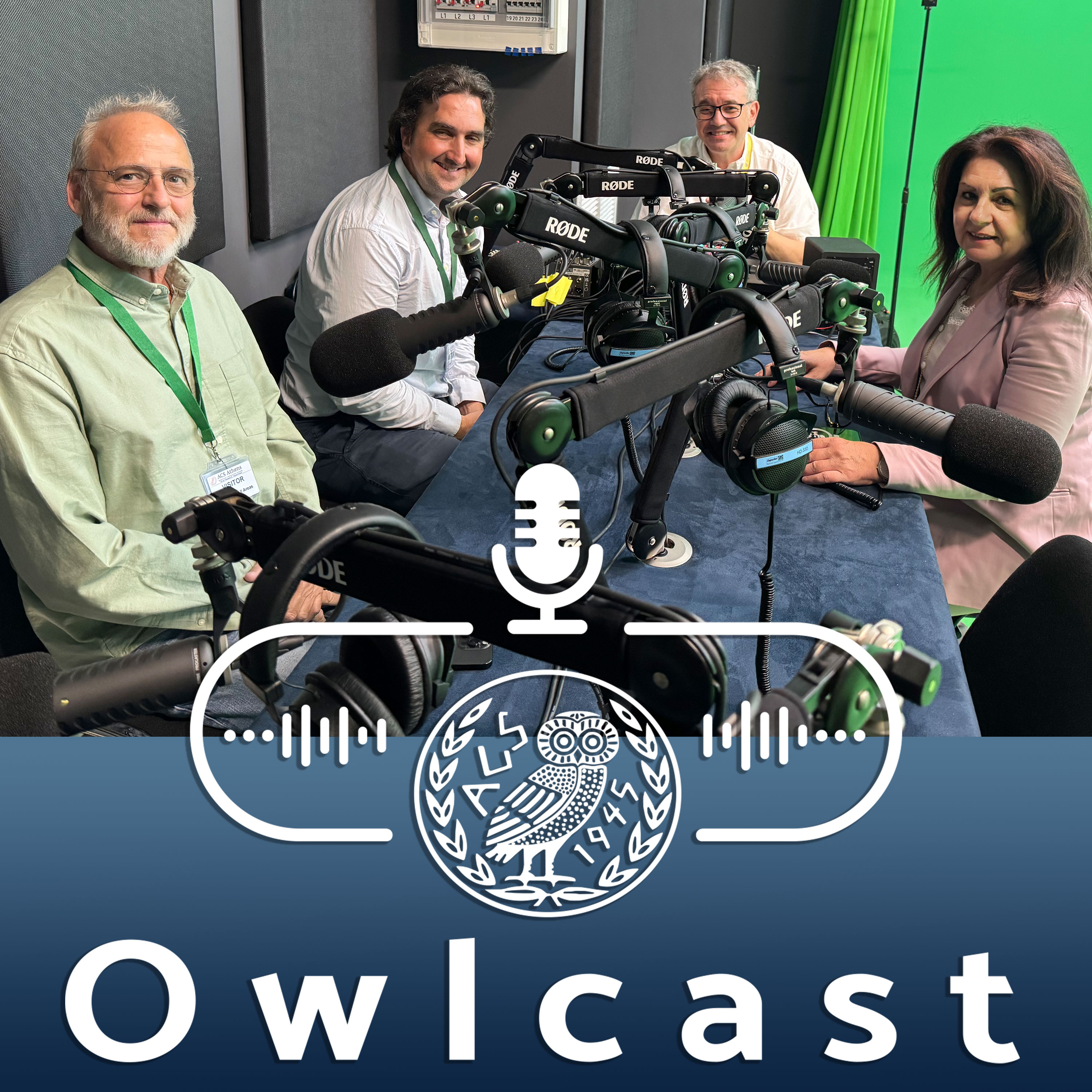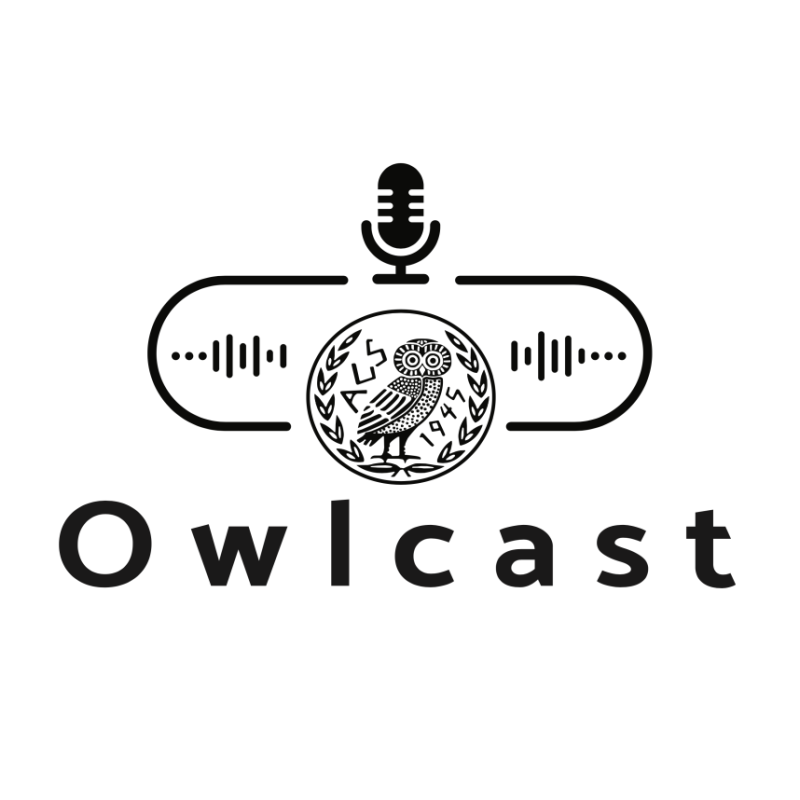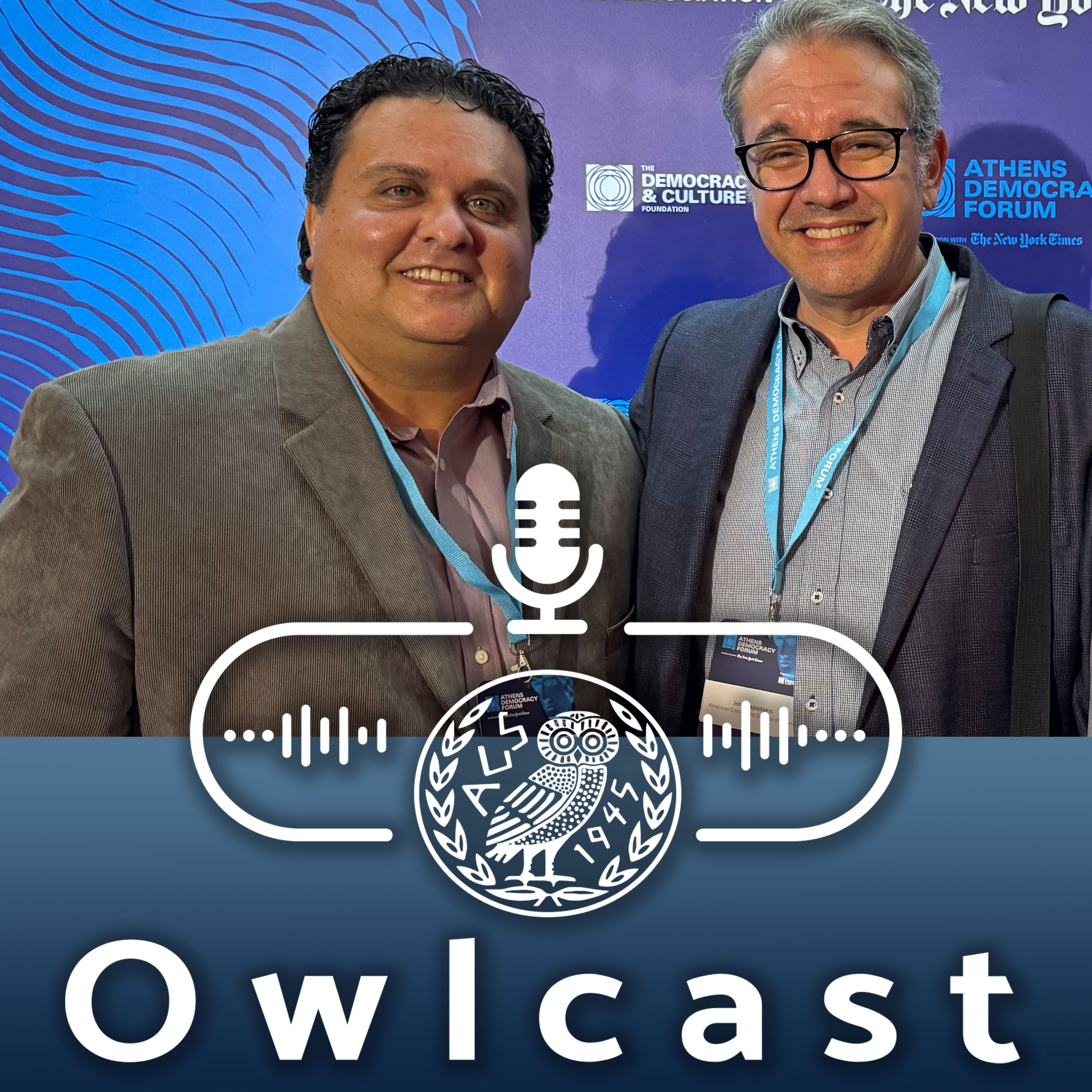Episode Transcript
Speaker 1 00:00:10 This is the Owlcast, the official podcast of ACS Athens.
Speaker 0 00:00:17 Listen
Speaker 1 00:00:18 To the exciting story of the American Community Schools of Athens. Check out what drives all the members of our international community of learners as we create the education of the future. Here's John Papadakis.
Speaker 2 00:00:41 Every year a number of college and university reps visit the acs Athens campus, talk to the students and their counselors attend meetings with teachers and the administration trying to feel the beat of the school and establish connections with potential candidates. But it's not very often that a university president pays us a visit. It's even more notable when this university has a longstanding collaboration established with ACS Athens. The bridge between K-12 and higher education seems to become shorter and shorter. While the frontier between the two academic ranks is blurred by such collaborations when graduate programs are offered focused on K-12 international school leadership, while at the same time high school students can take undergraduate courses. We are happy and honored to have with us today, Dr. Stacy m Robertson, the newly ascended president of Widener, University of Chester, Pennsylvania. Our collaboration with Widener University was established in 2019 under different leadership in both schools, but its value continues to be paramount to the scope and goals of both institutions.
Speaker 2 00:01:51 In November of 2022, AC Athens and Whitener University renewed the partnership to include engineering and ai. This was the conclusion of a meeting between ACS Athens President, Dr. Peggy Pelonis, and Dr. Stacy Robertson, president of Whitener University, when both presidents agreed to bring the partnership to a new level. This summer, a group of a C South and students are traveling to Widener University through the Summer Leadership Academy for a two week credit course where they attend classes led by university faculty while working on their own leadership development plan. Wener University is also hosting a five-day robotics engineering summer camp that includes hands-on activities, introducing students to the departments of the School of engineering, biomedical chemical, civil, electrical, mechanical robotics. The camp also includes hands-on robotics activities with AI components, especially designed for s Athens students that choose to participate in the engineering camp.
Speaker 2 00:02:53 Dr. Stacy m Robertson assumed the presidency at Widener University in July, 2022. An accomplished leader with impressive experience in strategic planning, workplace practices that support and promote people from underrepresented groups and developing curriculum that prepares students for success in the global workspace. Robertson came to Widener from State University of New York Geneseo, where she was Provost and Vice President for Academic Affairs and the professor of history, a distinguished author of four books. She also co-edited the book series Perspectives on Early America with, uh, London-based publisher and has co-directed the National Nonprofit Historians Against Slavery with Dr. Robertson. Today we discuss facing the key challenges of higher education as a new president, the documented loss of learning due to covid, capitalizing on the skills gained from online learning to help students go forward in higher education, the student growth mindset as a prerequisite for success, but also the willingness to take risks and fail the opportunities of social growth in the 19th century, and continuing the legacy of collaboration between ACS Athens and Widener University. You are the 11th president of Widener University, uh, 200-year-old institution in Pennsylvania, which claims that it offers students a mentored, meaningful experience that leads to success. You were installed in 2022, so what has been the biggest challenge and the biggest reward for you in the first year of leading Widener?
Speaker 3 00:04:51 The challenge of higher education in the United States right now really centers around several key themes. One involves post covid recoveries. We know that our staff, our faculty, our students are still in the process of recovering for what many was a series of traumas, and that affected mental health, physical health, it affected learning. We've experienced a tremendous amount of learning loss on the part of our students. We were isolated, we were siloed. So rebuilding our community, rebuilding a sense of connectedness and belonging is the absolute top goal that we have for, for all of us, really as a community to come together and to remember what it's like to be together, to eat together, to learn together, to laugh together, to talk together. All of those things were relearning as a community, and it's been absolutely wonderful this past year. But we've also had to understand that some folks are coming in with very serious mental health challenges, and so ensuring that we all have the tools that we need, whether that is opportunity to engage in counseling, whether that is opportunity to have guided nature walks and yoga and opportunity for group communication and spaces to be quiet and safe.
Speaker 3 00:06:29 All of those are, are really part of it. But also it's related to the learning loss element too. So we've tried to create opportunities for students to pick up the tools that they need to make sure
Speaker 2 00:06:41 They're, how, how was this a learning loss? How was it documented?
Speaker 3 00:06:46 So nationwide, there are standardized math, and particularly math and writing tests that students across the United States take. And what we see even at the earliest grades is that students are not at the levels we have seen in the past. So when they take those standardized tests, there are overall much lower scores on those tests. So the data is telling us, students are telling us this themselves because some are not doing as well in the same classes that they would've done a few years ago, but the data is telling us that the skill level is not there. Right. We're using the data to help us understand where we need to provide the tools mm-hmm. <affirmative> for our students mm-hmm. <affirmative>, as well as listening to our students, which is the most important thing that we can do. Mm-hmm. <affirmative> is talking and listening to them.
Speaker 2 00:07:32 Have you seen this loss also in the applicants or only in the students of the university? Have you seen this trend of post covid? Yeah. Uh, loss of learning, uh, in the new applicants of the school?
Speaker 3 00:07:46 You know, in terms of their overall scores, no, but we assume that there will be particular areas mm-hmm. <affirmative> where they will need assistance. But what we're also learning, and I think this is really important, we are not approaching our recovery from covid with a, what we would call a deficit mindset. We believe that our prospective students and our current students also gained tremendous skills and resilience. And we're also looking to enhance that and, and help our students to understand how to use and like to acknowledge those skills that they gained that they might not otherwise acknowledge. And to use those skills in ways that will help them in some of their classes and their projects and their experience of the university, and not to come in with an understanding that they're behind. We don't want that because that creates a mindset, which is very difficult to overcome. Mm-hmm. <affirmative>. So we, we encourage our students to come in. We appreciate everything that you bring to the table, and we wanna help to enhance that and to grow that. And we all have room to grow, right?
Speaker 2 00:09:00 Mm-hmm. <affirmative>, Widener University is based in one of the most historic states of the United States. Yes. In Pennsylvania where historic milestones of the nation curd. How do you as a university, as a person, reconcile with the past while looking towards the future? What can a student expect to find in Widener University that feeds from its history and leads to uncharted innovation?
Speaker 3 00:09:27 Again, what a wonderful question. I love it that you focus on the history of Pennsylvania, because I myself am a historian. That's my background. So I really appreciate that question. I think for our students, and really for students across Pennsylvania, but particularly in Philadelphia, the opportunities to learn through, in engaging, to learn through, um, visiting artifacts, museums, experiencing music, um, experiencing the history of Philadelphia itself and Chester, which is where we are particularly located, is so incredibly important. So let me give you an example. We have a student who initiated a project to uncover the invisible civil rights history of Widener University, and the ways in which our students of the past engaged in civil rights activism. And we now have a tour on campus of, um, civil rights events and opportunities and engagements historically. And it's a, um, it's a virtual tour. So there's just a url, URL code, and you go to that spot, you take a picture, and then you can listen to a history related to that mm-hmm.
Speaker 3 00:10:49 <affirmative> that specific space at a different time period. So we've really embraced the location. I believe that location is incredibly important. We also, um, in terms of education and learning, we also encourage and provide opportunities for our students to get out into the community and to give back to the community, and to engage with the community, to learn from the community around all kinds of different areas, whether that's education or it might be contributing to, uh, helping a local company, uh, around social media. It might be contributing to, uh, participating. We have a major league soccer team in Chester, so it might be volunteering with that at their soccer youth clinic, what you would call football, of course. Mm-hmm. <affirmative> mm-hmm. <affirmative>,
Speaker 2 00:11:38 Mm-hmm.
Speaker 3 00:11:39 <affirmative>. Right. So incredible opportunities to engage with the local community and to be a part of the community. We, um, both historically and now really believe it's so important to take down the walls. Right. We invite the community into our library, into our events, so that we are all one community together.
Speaker 1 00:12:05 You are listening to the Owlcast, the official podcast of ACS Athens.
Speaker 2 00:12:18 And so you have a new student, uh, who's coming to Widener, and what kind of skills or mindset would you say an ideal candidate of Widener should possess?
Speaker 3 00:12:28 You know, I think coming in with a mindset of growth, that is the most important element, uh, of mindset that I think we look for in our students. Mm-hmm. <affirmative>, someone who's looking to grow, someone who acknowledges that we all have room to grow is so incredibly important. I mean, it's, that's, that's by far and away the most important. But I think for students who are also looking for an opportunity to innovate for students who are looking for an opportunity to explore, right? I think curiosity is incredibly important for our students. A willingness to also maybe even ask important, a willingness to take risks and to fail. Because the truth is that the greatest opportunities for growth come through failure. I'm a big fan of failure. Mm-hmm. <affirmative>, I talk often about the failures that I've experienced as a leader, because I think we often, um, in particular as leaders, don't share those failures. Mm-hmm. <affirmative>, but the truth is we all have them. And it's how we grew from them, how we became resilient, how we Rose Strong. That's how we became leaders.
Speaker 2 00:13:32 Is this also relevant to your international school body? I mean Oh, yes. Someone who's coming from abroad, either from Europe or from Asia or from other places, um, I think the mentality of failure might be a little bit strange to them. <laugh>, you're coming there to succeed, so you have to have some way of absolutely connecting with these
Speaker 3 00:13:54 Students. You're absolutely right. And I think, I think that using the term failure itself is problematic outside of the United States. Right. And so you have to recognize that what you really need to talk about is the opportunity to grow through risk taking. I think that's language that an international community would find much more, um, understandable and appealing. Nonetheless, I think the opportunity to learn that failure is not an end place, but a beginning Right. Is really important. And that, but that lessons, those kinds of lessons can happen. Mm-hmm. <affirmative>, once you get to Widener,
Speaker 2 00:14:29 So from your cv, your resume, it is not difficult to conclude that you love history <laugh>. And from what you said just before, which historical era is the most intriguing or inspiring to you and why?
Speaker 3 00:14:43 The 19th century, I was just talking about this with my colleague. I am in love with the 19th century. Um, in part it's about there were so many opportunities for social justice growth in the 19th century, whether that is, uh, fighting slavery that may be, um, women's rights, it may be civil rights, it could be opportunities to, um, think differently and more broadly about religion, just incredible opportunities to grow and to, you know, honestly make the world a better place step-by-step. Right. And, and the 19th century was just full of the most fascinating movements, spiritualism, anti-slavery, like I said, women's rights. And, and in part what I love about those movements is that they were often led by what we would call normal people, right? The folks who were involved in these movements, they're not names you would have heard of their average people who decided to devote a part of their life, right. To fighting injustice and oppression and to committing to equity and really simply put, making the world a better place.
Speaker 2 00:16:01 You're talking about historical events, you're talking about the 19th century. I'm going to go off script here and ask you about how you feel about the, the latest developments on artificial intelligence. Why? Because it didn't start in the 2000 twenties. It didn't start in the 21st century or even earlier, thinking about the impact that historical events had in the life of the us, the world and so on. How optimistic are you by the use of AI in the humanities, or of course in science and technology, but having in mind the scope and the goals of your university?
Speaker 3 00:16:47 We've approached the opportunity, we've approached AI as an opportunity. We understand that there are risks as well, but we do not believe that AI is in particular something like chat, G P T, that this is something to, to be, um, fought,
Speaker 2 00:17:05 Which is just an iteration, right.
Speaker 3 00:17:07 Of ai. Exactly. It's not a battle. You're gonna win. What we're trying to teach our students and ourselves, frankly, with our students, how can we learn from enrich, understand AI in ways that are aligned with our values and our mission? And I think if we approach AI always with values, right, at the very center of, of what we do and how we teach, we will be in a good place. And I, I'm an optimist. I believe most of humanity is trying to get better. There are also risks, and I'm not naive, right? And so we need to pay attention to the potential misuse of AI and the damage that it could do.
Speaker 2 00:17:54 And of course, AI is something that is going to continue and in the academic life and so on. I have personal experience from teachers and university level that they're coming and they're saying, how can I compete with the answers given by AI when I don't know if it's ai and taking the lead from the latest European Union, uh, proposed legislation on AI regulation. They say that AI should be able to declare that what I'm producing is AI produced. Exactly. So that I think is one of the things that is gonna come to us Yes. In the next couple of years or months. <laugh>, we never know with ai. So I, I really appreciate your statement there. Um, you are visiting our campus in a time of continued and renewed collaboration between our two schools. Uh, acs, Athens and Widener have cultivated a valued partnership for many years through different projects.
Speaker 2 00:18:56 Uh, most notably, there was an M O U A agreement between our two schools in 2019, um, that opened the path for blurring the educational lines between international K-12 and US higher education institution. Your predecessor, Dr. Woolman and our previous president, Dr. J Lamas at that time, signed this agreement that allowed for graduate programs to be offered focused on K-12 international school leadership, while at the same time acs, Athens High School students could take online undergraduate classes. Of course, many things transpired since then. Like Covid, for example. <laugh>, yes. That, uh, brought online education and teaching learning skills to a new level. Mm-hmm. <affirmative>. Um, as the new president of Whitener University, what do you bring to this collaboration? Why do you think such collaborations could be beneficial to institutions like ours?
Speaker 3 00:19:51 Again, such a great question. So I would bill on what, uh, our two predecessors have already established, but I think the world is a different place, even just five years later. It's a completely different place. So when we talk about online learning, I think the ways that we have developed opportunities to engage in online learning are just completely different and so much better. So those opportunities are endless. And frankly, I would love to see us develop more opportunities for current students in a c s to engage with, in meaningful ways current students at Widener. I would love to see that peer to peer engagement, which I think can be very robust and may eventually involve students visiting one country and the other, and coming back and forth. I know that we have some students visiting this summer to engage with our engineering program, work a little bit on AI and leadership, which is gonna be absolutely fabulous.
Speaker 3 00:20:46 I think more opportunities to actually have our students visit each school, but also build before that online community, that online connection. I think there are a number of areas which we are building out at Widener that are gonna be appealing, frankly, to some of your students, whether that's in healthcare and, and allied health programs. We're developing new areas there, but also some of our technology based, our AI opportunities, computer science engineering, um, some of the work that's being established in our school of business, I think will be very interesting to a c s students. But I also wanna emphasize that I think our students engaging with a c s students will enrich both experiences. It's not a one-way path. It's really back and forth. And I really value the opportunity to just learn more about ACS Athens and about, um, how we can build out specifically programs that I think your students will be interested as well as ours. And I, I just wanna emphasize that peer to peer, because that can be so important.
Speaker 2 00:21:51 Dr. Stacy Robertson, president of, uh, Widener University, thank you so much for stopping by and for visiting c s Athens. Enjoy your visit to Greece. Thank
Speaker 3 00:22:00 You so much.
Speaker 2 00:22:01 Thank you.
Speaker 1 00:22:04 You are listening to the Owlcast, the official podcast of ACS Athens. Make sure you subscribe to the ACAST on Google Podcast, Spotify and Apple Podcasts. This has been a production of the ACS Athens Media Studio.



